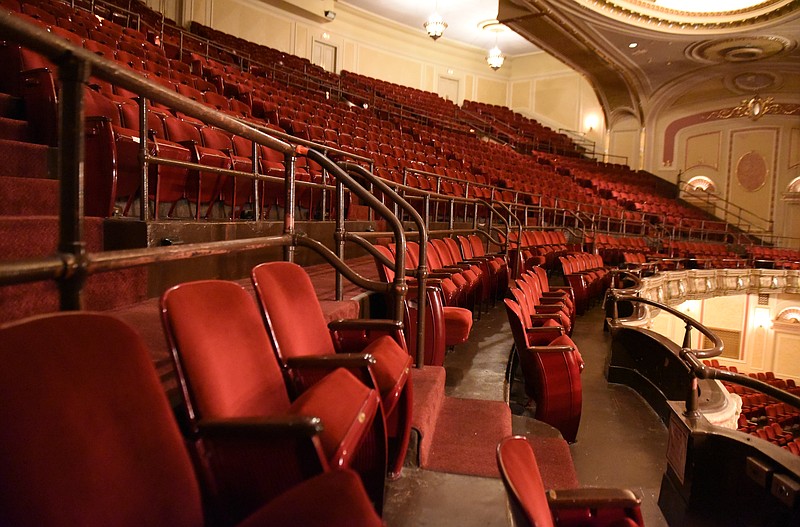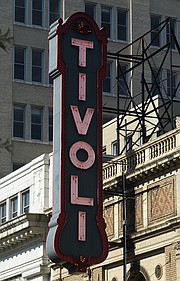Dan Bowers is retiring in June as president of ArtsBuild, five months short of his 12-year anniversary leading the local arts and culture organization. Prior to heading ArtsBuild, Bowers spent 22 years working with the United Way, including 14 years in Chattanooga.
When Bowers considers the 98-year-old Tivoli Theatre's place in the history of the city, what he sees is a community that refused to let a landmark die.

View our 150 years anniversary coverage
In fact, the Tivoli did almost die, twice, once in the early 1960s and once in the late 1980s. It's why the local newspapers record three different "grand openings" for the venue on Broad Street, all in the month of March. The first was the original opening on March 19, 1921; the second on March 5, 1963; and the last one on March 29, 1989."I think the fact that the arts were important enough to the community to preserve the Tivoli when not every community preserved its performance jewel says something," said Bowers. "The fact that people stepped up to give heroically to save the Tivoli was historic. Our symphony would be good anywhere, but to have a place where it feels like the symphony should be playing makes all the difference."
***
The application for the National Register of Historic Places, prepared by the Tennessee Historical Commission in November 1972, says the Tivoli opened as "the finest theatre in the entire South" and the "first theatre in the south to have air conditioning." It says the presence of the "Mighty Wurlitzer Pipe Organ" was instrumental to its historical significance.
The application says the Tivoli started as a project of the Signal Mountain Company, a local "start-up" founded in 1920 that exists today as Buzzi Unicem Signal Mountain on Suck Creek Road. Chattanooga architect R. H. Hunt designed the theater with Rapp and Rapp, a Chicago architectural firm which designed more than 400 theaters across the country in the early 1900s. The 2,300-seat theater cost $750,000.
Hunt moved to Chattanooga in 1882, three years after the newspaper industry began here. In addition to the Tivoli, Hunt designed Memorial Auditorium, the Joel W. Solomon Federal Building, the Hamilton County Courthouse and the St. John's Hotel.
The Tivoli roared through the first half of the 20th century as the center of arts and culture in Chattanooga before television came along in the 1950s. It nearly shuttered its doors in 1961 before the city leased it from Wilby-Kincey Service Corporation of Charlotte, North Carolina. The city purchased the Tivoli in 1976 for $300,000. The register application says, "When the renovated Tivoli reopened as a cultural center on March 5, 1963, it was hailed as the beginning of the 'revitalization of downtown Chattanooga.'"
The Tivoli was placed on the National Register of Historic Places on April 11, 1973.
***
The Daily Times (3 cents a copy) had 28 stories on its front page on the morning of March 19, 1921, but the 1 p.m. opening of the Tivoli didn't make A1. Among the news of the day that did included a notice that 490,000 "draft evaders" had one more chance to join the military before their names would be made public.
One of the seven headlines at the top of the page said, "BLONDE WOMEN DECLARED FICKLE; BARRED FROM JURY." The story reported that a New York Municipal Court judge, tired of lawyers' bickering during jury selection about which men to seat, declared the impaneled jury would consist of three men and three women. He then added, "There will be no blondes on this jury either. The blondes are fickle." A headline from Baltimore, Maryland, at the very bottom of the front page, said, "Two Negroes Hanged."
Inside the paper, one of two advertisements promoting the opening said the Tivoli was a "theatre of unequalled magnificence in the southland – the theatre will send you away gasping – the theatre that gives Chattanooga national prominence – the wonder theatre." Another proclaimed the Tivoli "the most beautiful theatre in the south."
The reporting from the Daily Times was little more than a schedule of the day's events. The official opening would take place after the third of four performances that day. Each would feature a personal appearance from rising silent film actress Mae Murray before the screening of "Forbidden Fruit," a film directed by Cecil B. DeMille. M.B. Ochs, brother of the Daily Times' publisher and owner Adolph Ochs, presided over the ceremony that featured Dr. Spencer McCallie and Mayor Alexander Chambliss.
The following day's coverage by the Daily Times was extensive, and the opening made the front page. The newspaper featured an interview with Murray and a story on visiting theater dignitaries. The report said, "All the visitors were highly complementary of the new theater, declaring that it compared favorably with the best moving picture houses in New York, and that it far excelled anything to be found in the south, north or west."
In previewing the second grand opening in 1963, the Times described the 1921 events as a "bittersweet reopening of the lovely old theatre. It was on March 19, 1921 – just two weeks short of exactly 42 years ago – that a special 20-piece orchestra set off the initial showing of the motion picture palace of that time."
The March 1963 reopening of the Tivoli did make the front page, and the reporting said the event would "take place tonight against a backdrop of interlocking pageantry in music and local history." Cellist Leslie Parnas joined the Chattanooga Symphony Orchestra in a musical program that signaled a shift away from the Tivoli's motion picture past.
The afternoon News-Free Press on March 6, 1963, left no stone uncovered in its coverage of the reopening. In addition to one-third of the front page covering the story, the paper featured a full page of pictures on its "Society" section front page. "The sound of rain," the paragraph accompanying the picture layout reported, "the sound inside of music and the sound of applause all over Chattanooga for the reopening of the Tivoli as the city's very own theater! Thus did last night's concert by the Chattanooga Symphony launch a new era in the civic, cultural and entertainment history of 'our town.'"
The final "grand opening" of the Tivoli on March 29, 1969, took place at 10 a.m. in the morning, which gave the afternoon News-Free Press (25 cents) the news break on the story. Mayor Gene Roberts and former Gov. Lamar Alexander, then the president of the University of Tennessee and later a U.S. senator, spoke during the ceremony. Alexander, as governor, had helped secure $3 million in state funds to assist in the renovation.
Having again fallen into disrepair, the Tivoli was closed in 1987. A group of citizens, led by Times' publisher Ruth Holmberg, raised more than $3 million that was used with state funds to expand and remodel the Tivoli. Selmon T. Franklin Architects designed the remodeled Tivoli and construction was done by Raines Brothers Construction.
The newspaper reported in 1989, "The heads of many people present swung left and right like those of spectators at a tennis match as they admired the Tivoli's ornate walls and ceilings." Mayor Robert said, "Today's Tivoli is the brightest man-made bloom of spring. We have exceeded the original grandeur of the theatre."
News-Free Press Editor Lee Anderson said, "Chattanooga's Tivoli Theatre was one of the nation's most marvelously beautiful entertainment showplaces when it first opened to the public 68 years ago. And today, as it reopens after an extensive remodeling and renovation program, it is a grander entertainment palace than ever, a source of justified community pride and magnificent usefulness."
***
The Arts Building located on 11th Street was given to ArtsBuild by Walter E. Hussman Jr., publisher and owner of the Times Free Press. Bowers led a community-wide planning process around the future of arts and culture in Chattanooga in 2011, which among other recommendations called for in the "Imagine Chattanooga 2020" study identified that a "single gathering place for the cultural community" did not exist in Chattanooga.
The gift from the Times Free Press addressed that issue, and Bowers knows the "gathering place" has been instrumental in making the arts more diverse, with a broader offering of activities.
"The arts were always downtown - and Lookout Mountain-centric," said Bowers. "We did a course correction with the plan. We were focused downtown, sort of a club of agencies. We were not focused on serving the broader community. There were only a few organizations involved in the arts. It was a much smaller universe in 1989 and before, and not everyone felt connected enough to believe that the Tivoli was for them. There were parts of our community that did not feel invited to take part.
"That's changing. We are a much more diverse arts community today. Our charge is to make sure as many people in the county as possible enjoy the arts resources here. It's important that as many young people as possible go into the Tivoli and see it, because it is at the heart of our cultural heritage here."

